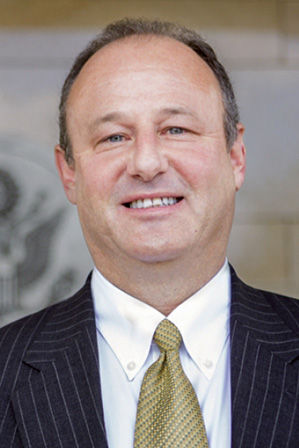Celebrating—and Strengthening—Constructive Dissent
President’s Views
BY ERIC RUBIN

All of us at AFSA were thrilled to be able to host our annual October awards ceremony in person for the first time in three years. We honored Ambassador Anne Patterson with our award for Lifetime Contributions to American Diplomacy, and recognized 17 others who contributed to advancing our country’s policies and interests. You can read more about all the recipients and their accomplishments in this issue of the FSJ.
Most rewarding and encouraging was the revival of applications for AFSA’s awards for constructive dissent. Not only did we have the greatest number of nominations for constructive dissent awards in recent memory, we were also able to honor some of the recipients for their success in achieving changes in U.S. policy.
I am proud to have been part of the group that won the 1994 William R. Rivkin Award for Constructive Dissent by a mid-level officer. Our dissent was over policy on the breakup of the former Yugoslavia and the lack of U.S. engagement to stop what was the worst war on the European continent since 1945 (recently echoed in Russia’s outrageous invasion of Ukraine). We did not see or achieve any quick turnaround in U.S. policy, but I hope to this day that we contributed to the conversation that led the U.S. to decide to intervene to stop the slaughter.
Constructive dissent is a long Foreign Service tradition. The formal Dissent Channel dates back to the U.S. wars in Southeast Asia and the widespread opposition of members of the Foreign Service to such U.S. actions as the Christmas bombing of Hanoi and Haiphong and the bombing and invasion of Laos and Cambodia. The FAM (Foreign Affairs Manual) language reads:
“It is Department of State policy that all U.S. citizen employees, foreign and domestic, be able to express dissenting or alternative views on substantive issues of policy, in a manner which ensures serious, high-level review and response. … Freedom from reprisal for Dissent Channel users is strictly enforced; officers or employees found to have engaged in retaliation or reprisal against Dissent Channel users, or to have divulged to unauthorized personnel the source or contents of Dissent Channel messages, will be subject to disciplinary action. Dissent Channel messages, including the identity of the authors, are a most sensitive element in the internal deliberative process and are to be protected accordingly.”
To our knowledge, State and USAID are the only federal agencies that guarantee the right to express—internally—dissenting policy views. While this is something that we should be rightly proud of, the truth is that the use of and confidence in the Dissent Channel has varied widely over the years. There have been times when it was made clear that dissenting views were not welcome and would not be seriously considered. Unfortunately, some FS members reacted to that discouraging message by going public with dissenting views, something that should never happen.
I am glad to report that we are back to having robust and healthy use of the Dissent Channel and, more importantly, we are seeing the current administration consider and even implement some of the dissenting recommendations. Secretary Blinken personally reads every dissent message and contributes to the responses, and the current leadership of the Secretary’s Policy Planning Staff has been assiduous in encouraging use of the channel and taking submissions seriously. That is worthy of our praise and appreciation.
Further, the current administration encourages employees to contribute to dialogue and debate on policy, not only through the Dissent Channel but in the course of their regular work. The most important principle, which Secretary Blinken has spoken about publicly, is not that good leadership tolerates dissenting internal views and ensures that dissenters are not the subject of reprisals. Rather, it is the recognition that constructive internal dissent can lead to better policies, better ideas, higher morale, and a stronger United States if it is encouraged and taken seriously.
That is the U.S. Foreign Service tradition at its best.
When sharing or linking to FSJ articles online, which we welcome and encourage, please be sure to cite the magazine (The Foreign Service Journal) and the month and year of publication. Please check the permissions page for further details.

